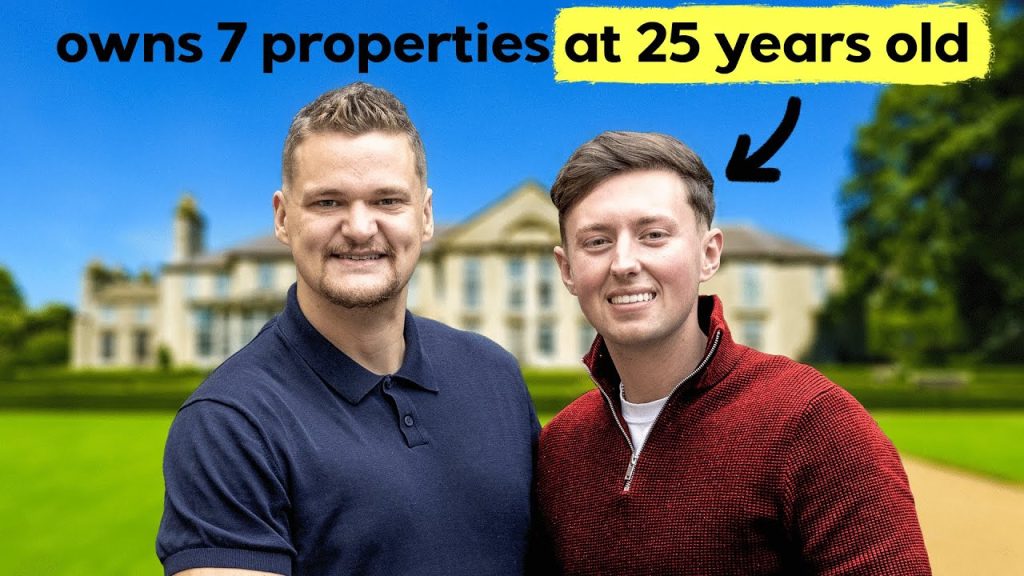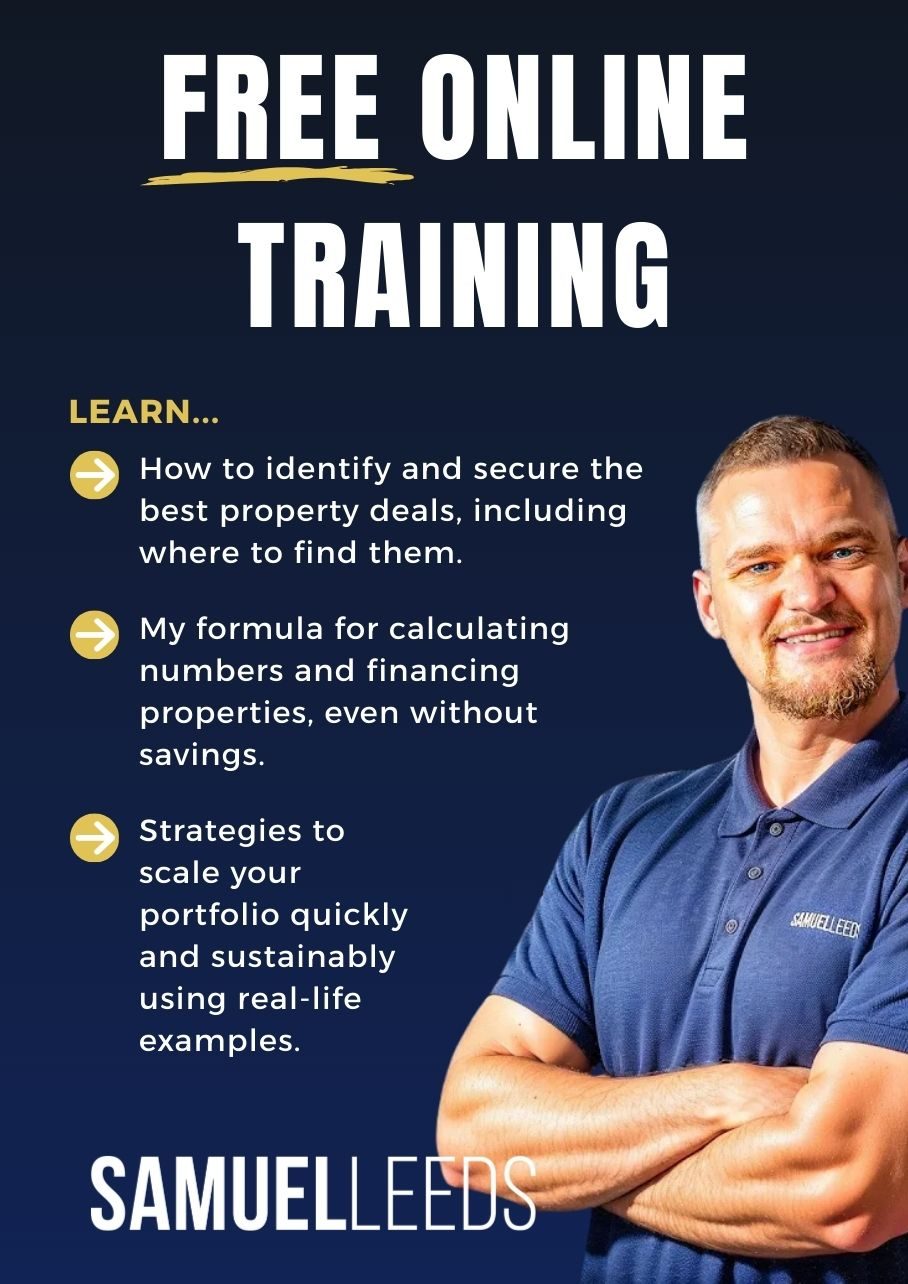A bad injury ended Jordan Jones’ professional football career. Instead, he became a taxi driver and now combines that with earning money from bricks and mortar. He already owns seven properties and controls five others which he rents out. On top of selling investment deals, his average takings amount to £10,000 a month. Remarkably, Jordan is still only 25 and just a year into his training with Samuel Leeds.
‘I dropped someone off for £3.20 and then closed a £10,000 deal’
It was while out driving a taxi that it came home to Jordan just how much money there is in property.
“I’d just dropped someone off for £3.20, helped them with all their shopping and got in the car. Then I closed a deal for £10,000. I was thinking what am I doing? I’m in the wrong game.”
It was a surreal moment in his journey to becoming a successful deal sourcer with a large portfolio of rental properties. At one time he had a very different future mapped out for him as a soccer star.
He joined Swansea City at the age of seven and worked his way through the academy, playing professionally as a scholar on an apprenticeship after leaving school. Then in his second year he was injured.
After two operations Jordan had to stop playing football and was left pondering what to do next.
“I was umming and ahhing whether to go to university and study business, work with my dad, or a few other things I was thinking of doing. I ended up going with my dad. He was like come and work with me. I’ll teach you business.”
At 21, Jordan started driving taxis for his father’s firm, putting in 12-hour shifts five to six times a week and picking up various ‘characters.’
“That was good for me. Some people may have thought I’d taken a step backwards because I was driving taxis instead of playing football. But I felt it put me on the right path to explore different types of business.”
The former Swans player had already bought properties in the traditional way by saving up for the deposits when, in February 2023, he came to a Samuel Leeds crash course with a pal.
Jordan admits his attitude was bordering on ignorant. “I thought I’ve got a bit of property. I kind of know what I’m doing. But then every time Samuel said something me and my friend would look at each other as if to say we know nothing.”
Having been introduced to the world of property investing, Jordan signed up for advanced training and has been on ‘a high ever since.’
His strategy has been to buy properties in Swansea which are so rundown they are unmortgageable. He then renovates the accommodation and obtains a mortgage based on the new value to release funds for reinvesting.
Explaining how the buy, refurbish, refinance method works, Jordan says: “You buy the property whether it be through actual cash or a bridge [loan]. You’ll then add value through a refurb and refinance it at the higher value. So, 75 per cent of that comes back to you and hopefully you can recycle most of your money to use that again and again.”
It differs fundamentally from the buy-to-let strategy where the investor puts down a deposit of 25 per cent of the purchase price, sinking that money in permanently.
Swansea is a good place to pick up bargains as prices are not extortionate, the young entrepreneur points out. Jordan paid just £39,500 for his last property, although he concedes it was ‘a steal.’
He never expected to secure it for that amount as it was on the market for £50,000.
“There wasn’t a lot of interest in it. It was around October. I said to the estate agent I’m offering this on the Friday. By the Monday it’s gone. It’s only over the weekend that the vendor [can] think of it because I’ve got other offers on the table. She came back to me on the Monday afternoon and said your offer’s been accepted.”
There was just one problem. At the time all his money was tied up.
“I went home to my parents and was like, I don’t know what I’m going to do. I’ve had this offer accepted on this property. I’m probably going to have to package and sell it on.”
Jordan told them about the opportunity and mentioned he would be looking to bring in an investor and give them a 10 per cent return on their cash.
“I remember going upstairs and my dad called me and said talk to me about the deal again. He ended up putting the money in. He will receive a fixed return of ten per cent when I refinance the property.”
The renovation and fees came to around £34,000. Based on a projected end value of £125,000, Jordan will be able to obtain a mortgage and pull out more than £93,000 – having only put in about £75,000 to buy and do up the three-bedroom property.
As the purchase price was so low there was no stamp duty to pay. The plan is to turn it into serviced accommodation for six guests, with two beds in each room.
He expects to make a profit of £1,000 to £1,500 a month from just that one property by renting it out mainly to contractors which he has found works best.
Jordan’s parents are delighted by what their son has achieved but questioned at first whether he was doing the right thing and worried he was wasting his money on training.
Apart from the buy-to-let strategy, Jordan had no knowledge of other investment techniques when he attended the crash course.
“My dad was making a joke saying I’m your mentor. You don’t need Samuel Leeds. I’m going to help you with this.”
He was also investing in real estate, but not using creative strategies – much to Jordan’s frustration when he joined the academy and began learning his craft.
“He invests the traditional way just buying cash. He adds value but doesn’t refinance. I said dad you could have ten x’d your portfolio if you had done buy, refurbish, refinance.”
It took a few months for Jordan to see the fruits of his labours. “I’d be working upstairs doing the training and my figures and my dad was like any deals? Is it going to work? I just kept working away and finally the breakthrough came where things started happening.”
Jordan banks £10,000 from one property deal
Samuel Leeds teaches his students that when they find a BRR opportunity, even if they haven’t got the money to snap it up, they can still sell it to an investor. Jordan followed the advice and soon struck gold, selling two such deals in November and one last month (January 2024).
One earned him a commission of £3,000 and another one £5,000 which included a £2,000 fee for him to manage the refurbishment of the property for his client.
Then he went one better by banking a sourcing fee of £10,000. It might seem a lot, says Jordan. However, after consulting his mentors he realised the return on investment was huge.
“When my investor refinances, he’s going to make £13,000, have the property and pay me £10,000. It makes sense for him. The purchase price was £74,500, the refurb £40,000 and the GDV (Gross Development Value) is around £195,000.”
Once the development is complete, the customer will release over £146,000 from taking out a mortgage, enabling him to recoup his investment plus £13,000, according to Jordan’s calculations.
Jordan found all the deals through the same agent. On his training, he was taught how to assess how much a house or flat is likely to be worth once it has been improved. He seeks the opinion of three different local agents on the end value.
After that Jordan applies a formula supplied by the academy to work out if the numbers stack up. He looks at the average square footage price for the area and takes his builder with him on every viewing.
He also includes a contingency of five per cent of the anticipated cost of the renovation to allow for any unexpected work that needs to be carried out. Then his skills come into play to negotiate the purchase price and finally to present the figures to his investor.
It depends on when you buy as to what sort of a deal you get in Jordan’s experience. He secured the property that made him £10,000 around Christmas.
“I don’t think many people were trying to buy around Christmas time. It’s an uncertain time in the market.”
He agrees with his guru Samuel that the more offers you submit the luckier you get and that it is a question of finding a motivated seller.
Jordan has the advantage of not having to compete with first time buyers or buy-to-let investors as the properties he buys are umortgageable and are therefore cash purchases.
Airbnb attracts international clients
Aside from deal selling and his buy, refurbish, refinance projects, Jordan has also been investing in rent-to-rents.
He and two business partners had been flirting with the idea for a while. Then two properties became available through a landlord Jordan knew.
The ex-footballer offered him a guaranteed rent and a three-year contract with a six-month break clause, also undertaking to keep the property in pristine condition.
Jordan made it clear it would be advertised on Airbnb and booking.com but that it would principally be contractors staying there.
He and his partners spent late nights painting one of the properties and cleaning it, while a friend with a flooring business put in new carpets.
“It scaled from there. We took on two more last month and another one this month (February 2024).”
They spent about £1,500 on doing up the first rent-to-rent which they took on, doing much of the work themselves. It costs them £850 a month to rent the place and they managed to attract international clients.
“They got in contact with us from Airbnb. Now we’ve housed 18 of their workers. That one property makes £800 but across the five last month it was £6,500. This month it will be £7,500.”
Jordan came across Samuel Leeds on Instagram and has now been on his academy programme for 10 months.
His biggest challenge has been getting more investors. “That’s when I started coming on the Mastermind (mentoring Zoom call) every week. Once I started telling people about what I’m doing that’s when it kicked off and they started to trust me.”
His next goals are to tackle commercial ventures and to help new academy students. “I’m hoping to go full time in property, but I want to help my dad in his business as much as I can because it’s grown massively.”
“The academy has been unbelievable,” he added. “I’ve met some friends for life. There are so many people I’ve connected with who have helped me along my journey.”
His parents are his inspiration. “I’ve seen them come from nothing and my dad’s worked tirelessly. I used to go to work at five o’clock in the morning. He’d be up doing invoicing or something work related. I wanted to live up to his standards.
“I’m pushing myself to do well but then hopefully to leave something in years to come when I have children to give them the best start in life.”
Jordan’s tips
- When you get into property you think you need a load of money to get involved but it only costs a couple of hundred pounds to become compliant as a deal seller.
- Get around the right people who are on the same type of journey you want to go on.
- Take action. That’s where I’ve learnt the most.
Samuel Leeds’ verdict
“Jordan has done incredibly well at just 25. I really respect what he’s done and look forward to continuing to see him win.”






